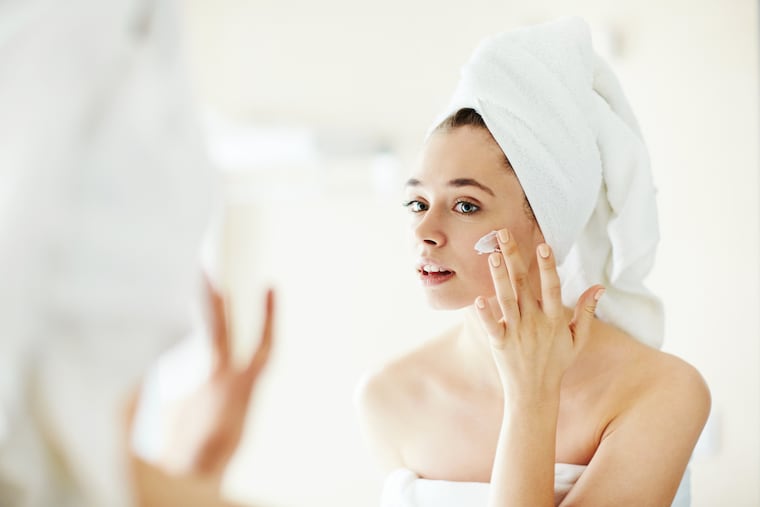Can estrogen cream combat skin aging signs? Here’s what dermatologists say.
If there are any benefits from prescription estrogen creams, they must be weighed against risks.

The question: Is it true you should use estrogen cream on your face to protect against signs of skin aging?
The science: As women enter menopause, many may experience skin changes. Once the body stops producing the hormone estrogen, skin becomes drier and loses collagen and elastin more quickly, resulting in greater sensitivity, fine lines, and wrinkles.
“That is really devastating for some women,” dermatologist Heather Rogers said.
While research suggests topical estrogen products may help improve skin dryness, texture, and elasticity in menopausal women, experts say it is understudied for facial use.
Prescription estrogen creams are intended for vaginal use. Creams containing estradiol, a potent estrogen, are approved to treat the vaginal dryness and frequent urinary tract infections that can come with menopause, but some dermatologists prescribe them off-label for the face.
In one study, skin elasticity and firmness significantly improved, and wrinkle depth and pore size decreased by 61 to 100%, after six months of treatment with 0.01% estradiol and 0.3% estriol (a weak estrogen) compounds in women who were perimenopausal or postmenopausal or had had a hysterectomy, with signs of skin aging. But such results may depend on the type of estrogen used, the concentration and dose; and it is unclear whether such effects are from direct contact with the facial skin or from the amount that is subsequently absorbed into the bloodstream, experts said.
As for whether it is safe, systemic estrogen-only therapy has been associated with an increased risk of endometrial cancer or uterine cancer. Combined hormone therapy has been linked to a small increase in risk of certain types of breast cancer, heart attack, stroke, and blood clots in some women.
The amount of estrogen absorbed through the skin, particularly when applied only to facial skin, is unlikely to raise estrogen levels in the blood enough to cause concern, some experts said. A systematic review of the safety of low-dose vaginal estrogens in menopausal women reported, for instance, that there was not a higher risk of uterine cancer.
The skin of the face is less absorbent than the mucosal surface of the vagina, so, theoretically, even less estrogen would make it into the blood through facial application, said Elizabeth Suh-Burgmann, chair of gynecologic oncology for Kaiser Permanente's Northern California region.
But Scott Isaacs, president-elect of the American Association of Clinical Endocrinology, said, “where to draw that line of where it’s safe and where it’s unsafe is going to vary in the individual person and their individual risk.”
Women with a history of hormone-sensitive breast cancer, for instance, should exercise caution and first speak with their health-care provider, experts said.
Many dermatologists do not recommend over-the-counter estrogen creams marketed for the face. These creams often contain estriol and are not approved by the Food and Drug Administration. Because they are not regulated, they may contain other forms of estrogen such as animal- or plant-derived estrogens and at various concentrations, said Anthony Rossi, a dermatologist and dermatologic surgeon at Memorial Sloan Kettering Cancer Center.
What else you should know
Topical estrogen cream is not recommended as a first-line defense against signs of skin aging. Dermatologists said women should try better-studied products first:
- Tretinoin, a retinoid, is a prescription topical medication that can help increase cell turnover and build collagen, reducing fine lines and wrinkles.
- Glycolic acid or lactic acid are over-the-counter products that may be recommended for those who cannot tolerate retinoids.
- Hyaluronic acid, which can bind to over a thousand times its weight in water, can help restore moisture in the skin, Rossi said.
- Sunscreen protects skin from damage from the sun’s ultraviolet light, which is a primary cause of skin aging.
- Topical antioxidants such as niacinamide and vitamin C serums help protect skin from UV damage and signs of aging.
- Moisturizers with squalane mimic the body’s natural moisturizing factor, Rogers said.
The bottom line
Topical estrogen is not a holy grail of antiaging, and more research is needed on the effects of using it on the skin for cosmetic purposes, experts said. But when used as prescribed off-label by a dermatologist, estrogen creams on the face are unlikely to increase health risks for most women.